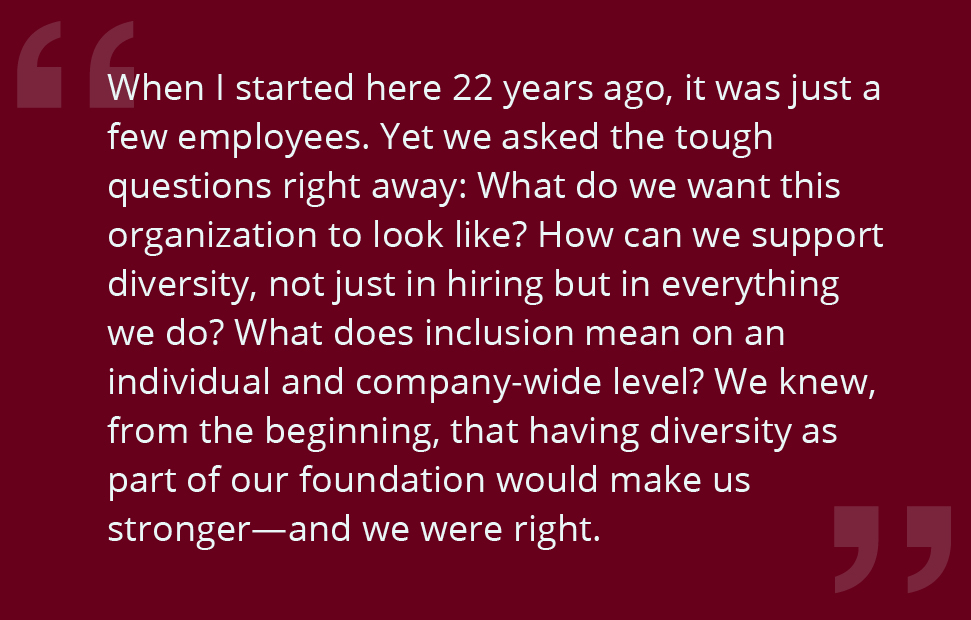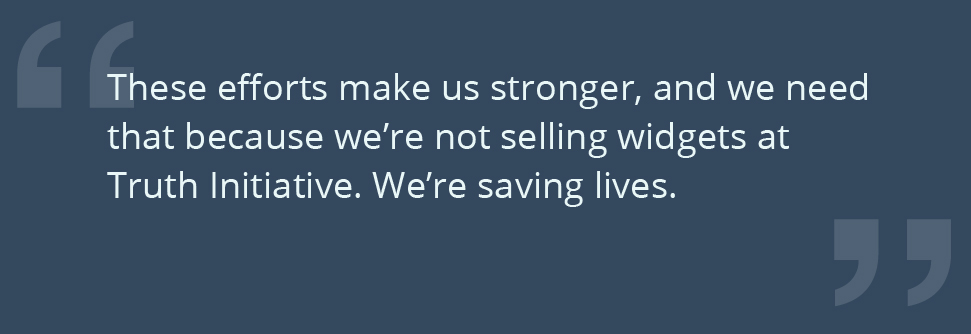From the beginning, diversity, equity, and inclusion has been in our DNA.
Especially over the last year, social justice has been in the spotlight, and it’s good to see many organizations now thinking deeply about how they approach diversity, equity, and inclusion (DEI) in the workplace. But at Truth Initiative, that was a conversation we started on day one.
From Black, Native American, and Hispanic populations to LGBTQ+ and people of lower income, the tobacco industry has a laser focus on groups like these, which means we do, too, as part of our mission to inspire lives free from smoking, vaping, and nicotine.
When I started here 22 years ago, it was just a few employees. Yet we asked the tough questions right away: What do we want this organization to look like? How can we support diversity, not just in hiring but in everything we do? What does inclusion mean on an individual and company-wide level? We knew, from the beginning, that having diversity as part of our foundation would make us stronger—and we were right.
Over the past 2 decades, we’ve implemented numerous strategies that build on that foundation, including:
- Hiring processes that emphasize diversity. To understand minorities and what they go through with tobacco, we needed these voices in our organization. Our processes for hiring and retention have always been focused on getting the best talent and the widest possible range of these voices. No permanent open position may be filled until the hiring manager has interviewed a diverse slate of candidates. Our diverse slate requirement explicitly recognizes people who identify as Black, LatinX, Indigenous, or a person of color; having a self-disclosed disability; self-disclose as LGBTQ+; or is a veteran.
- To offset student loan debt, we contribute toward tuition assistance. Among minorities and low-income groups, student loan debt is a huge burden. It becomes a major sticking point that holds them back professionally. We love education and professional development, and we believe that should not be restricted due to affordability. So, we generously contribute toward tuition for our employees, and as a result, we see employees who are able to complete their undergraduate and master’s degrees and begin doctorate programs.
- We talk about diversity in the workplace. We have required implicit bias and allyship training for all staff. Recently we educated all staff about proper usage of terms relating to sexual orientation and gender identity.
- We foster professional development. Our in-house initiative is called Truth yoU, and it’s a program that offers a breadth of trainings, seminars, and book talks, including topics ranging from self-improvement, financial literacy, management skills, and public speaking.
- No matter where an employee is located, this is a safe space. After George Floyd was murdered, we immediately had a discussion on Zoom for our teams. We did the same thing after the shootings in Atlanta that targeted Asian people. Creating safe spaces where people can support each other and have honest discussions is part of what makes us cohesive. We don’t run away from the hard conversations. We always try to be intentional, in everything we do.
- Our diversity committee offers policy suggestions. This committee, with over 45 members across the organization, recommends office policy and practices to senior leadership. It’s been a key partner in championing educational diversity-focused events and building a significant library of anti-racism resources for staff.
- We recruit a diverse set of interns. A tremendous amount of effort has gone into creating an internship program that’s robust and diverse. We recruit from historically Black colleges and universities and we’ve done a great job bringing in a wide range of young people. That’s so important because they’re our future for public health. They come from different backgrounds and offer different voices to our workforce.
In addition to all of these efforts, we’re always exploring new ways to embrace the importance of diversity. For example, we recognized Juneteenth before it was declared a national holiday.
These efforts make us stronger, and we need that because we’re not selling widgets at Truth Initiative. We’re saving lives.
We need to have people who represent the communities being impacted by tobacco to help fight this issue.
We’ve done a great deal for diversity, equity, and inclusion in the workplace during the past 22 years, and we’re looking forward to doing so much more.






